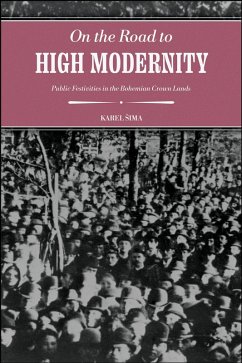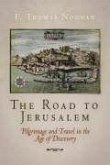Why, where, when, and how should individuals engage in festivities? On the Road to High Modernity traces the modernization of public festivities during the nineteenth century, focusing on the Bohemian Crown Lands of the Habsburg Monarchy. Characterized by its rapid and successful modernization in the final century of the Monarchy's existence, this territory serves as a unique laboratory for examining the evolution of modern political culture. As organizers of celebrations navigated the complexities of an increasingly fragmented society marked by ethnic, religious, and social divisions, they faced the daunting challenge of promoting diverse interests. By analyzing the intricate organization of festive events in public spaces, it is revealed how these activities were not merely celebrations, but strategic orchestrations that balanced rationality with emotion, discipline with spontaneity, and the interplay between public and private realms. These modern festivities were instrumental in promoting various agendas within the intricate landscape of Central European identity politics—be it nationalist aspirations, monarchical loyalty, class interests, or religious affiliations. Ultimately, these celebrations had profound implications for the stability or disruption of political and social order in the late Habsburg Monarchy.
Bitte wählen Sie Ihr Anliegen aus.
Rechnungen
Retourenschein anfordern
Bestellstatus
Storno


![The Trials Of James, Duncan, And Robert M'Gregor, Three Sons Of The Celebrated Rob Roy, Before The High Court Of Justiciary, In The Years 1752, 1753, And 1754 [For The Abduction Of Jean Key]. To Which Is Prefixed A Memoir Relating To The Highlands, With A The Trials Of James, Duncan, And Robert M'Gregor, Three Sons Of The Celebrated Rob Roy, Before The High Court Of Justiciary, In The Years 1752, 1753, And 1754 [For The Abduction Of Jean Key]. To Which Is Prefixed A Memoir Relating To The Highlands, With A](https://bilder.buecher.de/produkte/61/61235/61235691m.jpg)





